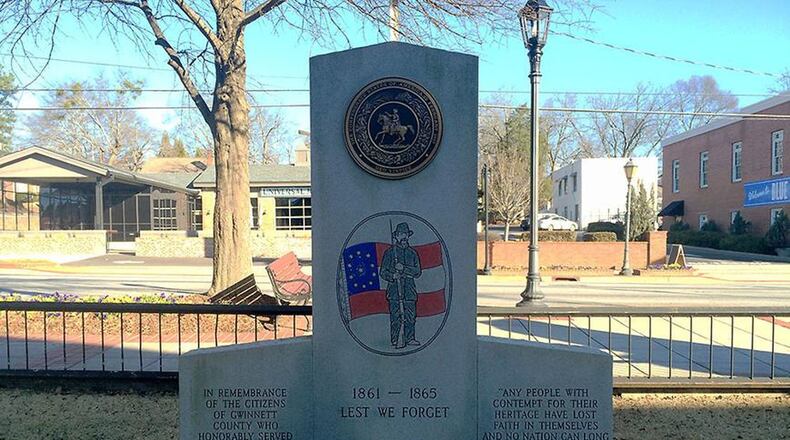The day after Martin Luther King Jr.’s birthday is celebrated, members of the Gwinnett County Board of Commissioners are expected to vote to put into storage a Confederate monument that was erected in Lawrenceville’s square in 1993.
The vote comes at the second meeting of the new board of commissioners, helmed by Nicole Love Hendrickson, the first Black person to lead Gwinnett’s government.
The board is made up of four Black members and one who is biracial and identifies as white and Asian.
Since the middle of last year — when a monument to the Confederacy in Decatur was removed, and other governments followed by taking local statues down — some residents in the county have agitated for Gwinnett’s statue to be moved, as well. The mayor and city council in Lawrenceville were among those asking that the monument be taken down.
State law prohibits the removal or relocation of Confederate monuments, except “for the preservation, protection, and interpretation” of them. Just Friday, the Stone Mountain Memorial Association said Confederate flags that fly at the base of a popular trail at the mountain’s base are protected by law and can’t be removed.
But a resolution Gwinnett commissioners will vote on Tuesday says the monument was vandalized twice — most recently on Thanksgiving Day — and keeping it on the Lawrenceville square “may result in additional acts of vandalism and create a public safety concern for the City of Lawrenceville and Gwinnett County.”
It asks that the monument be put in storage until a lawsuit filed by Gwinnett Solicitor Brian Whiteside is resolved.
“Absolutely, unequivocally, it needs to be removed,” said Marlene Taylor-Crawford, president of Gwinnett’s United Ebony Society. “You can’t justify having it any longer.”
The Lawrenceville monument has an early Confederate flag etched into it, as well as a picture of a Confederate soldier and, among writing, bears the dates 1861-1865 and the notation “LEST WE FORGET.” It also has a quote from Winston Churchill.
Joseph Bath, commander of the Lawrenceville camp of the Sons of Confederate Veterans, called it “the most benign monument in the whole Confederacy.” He said he is concerned that if commissioners vote to move it, the statue will be damaged.
Bath is part of the litigation, and said he couldn’t comment extensively about what might happen to the monument. But he said the monument is protected by law, though he understands that times have changed.
“I don’t want you to think I’m some kind of rabid, fire-breathing racist, because I’m not,” he said. “I just happen to be in love with history.”
But Taylor-Crawford and others said racism is inherent to the monument, which was erected in Gwinnett as the minority population began to increase. Now, just over half of all residents in the county are white, while 30% are Black.
“The fact that it’s there, tormenting people — this is a reminder, ‘Stay in your place,’” Taylor-Crawford said. “That is a symbol of hate.”
Kirkland Carden, a county commissioner, ran for office saying that he would bring the monument down. He said putting the statue in storage was “a good, temporary fix” while the court continues to work out what should ultimately happen with it.
“Gwinnett has always tried to be a welcoming, inclusive, world-class community,” Carden said. “To be a welcoming community, we’re going to have to step away or remove these Confederate markers of hatred.”
He said the monument’s location will be kept a secret to keep it from being damaged.
Ben Ku, another county commissioner, said the monument has been “a lightning rod” in the county. He noted that because the monument was placed on county property with the board’s permission, “it makes sense to rescind that permission.”
“Addressing the issue needed to happen,” he said. “I’m thankful for the opportunity for the board to publicly discuss this topic.”
Steve Babb, a member of the Gwinnett Remembrance Coalition, said the monument is particularly egregious because it’s located near the site of a 1911 lynching that wasn’t memorialized. He called it a “slap in the face for Gwinnett residents of color” and said it’s well past time for it to go.
“The reality of these monuments is they usually have a political agenda that goes beyond their usual historical significance,” he said. “From my perspective, the memorials should have never been put up in the first place.”
About the Author
The Latest
Featured



